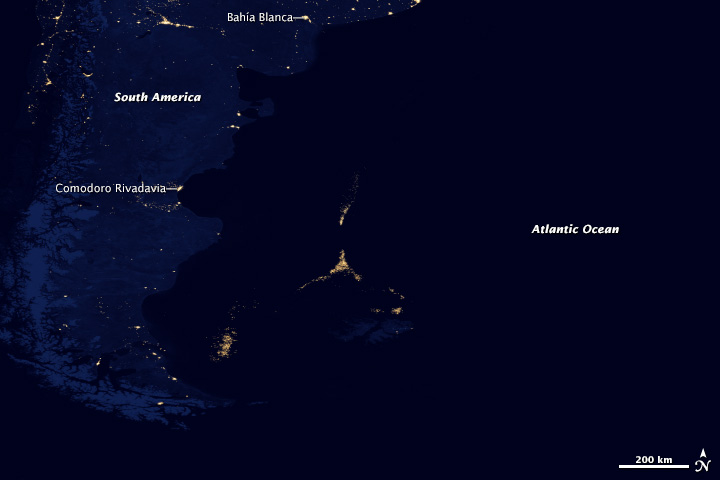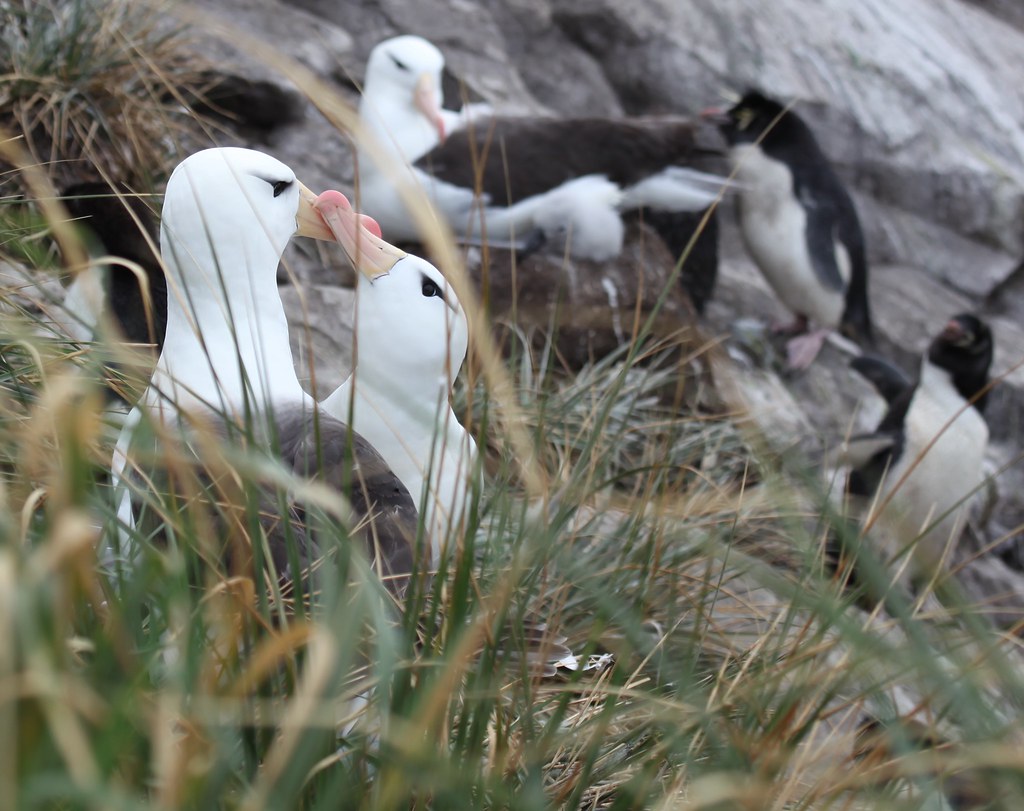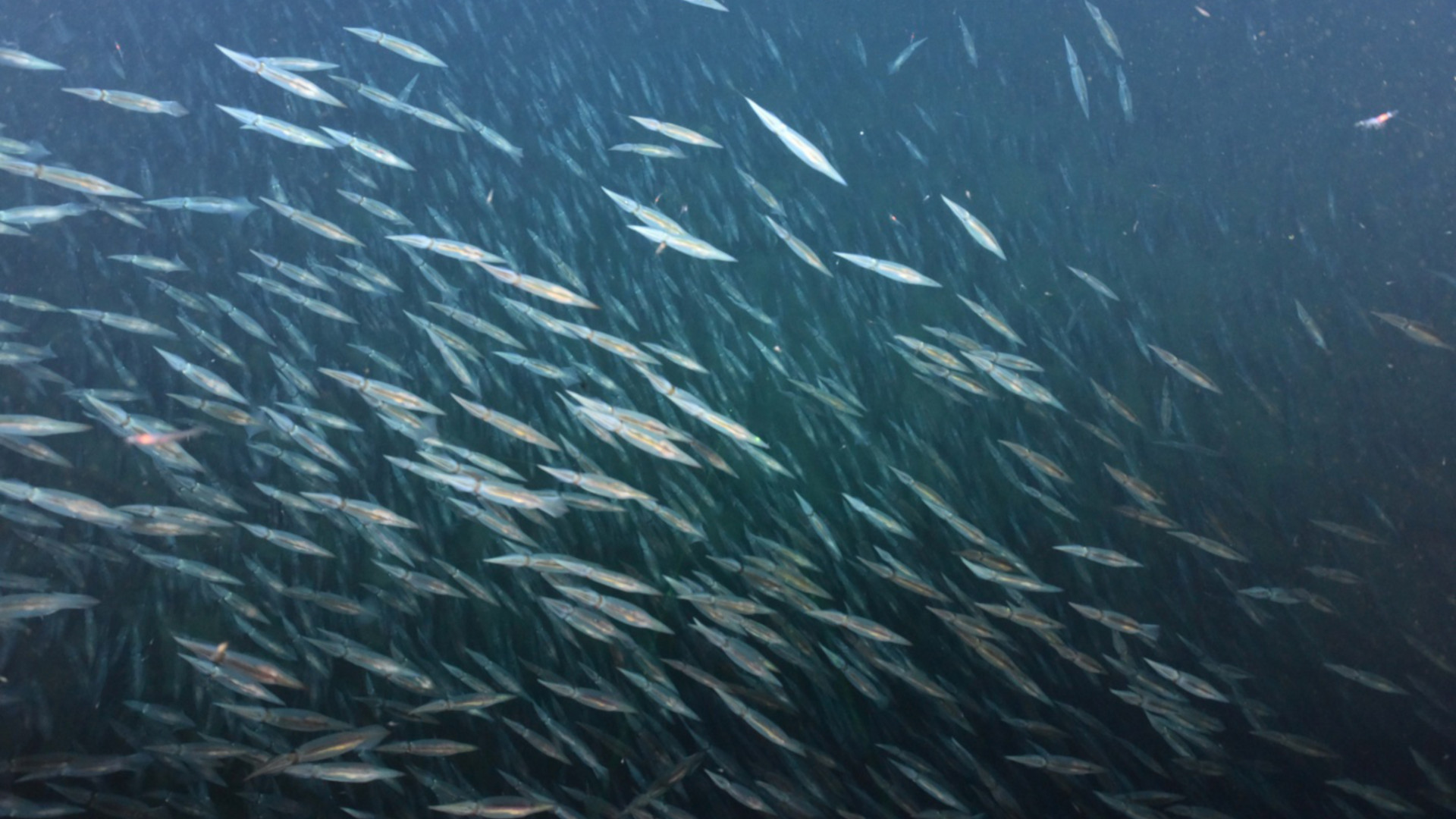In the Southern Atlantic, approximately 200 miles off the coast of Argentina, so many fishing vessels gather in one place that they can be seen from space. They’re engaged in intense competition for the valuable illex squid (Illex argentinus), which themselves are drawn to the nutrient-rich shelf break beneath the surface.

While many of these vessels operate legally, many others do not. As many as 300,000 tons of squid are taken illegally from the region each year — much more than the 50 to 150 tons that are allowed to be harvested legally.
In part this massive illegal fishing operation is the result of the distant and remote nature of the fishery itself. But it’s also inspired by longstanding political angst that impedes cooperation between Argentina and the United Kingdom territory known to some as the Falkland Islands and others as the Islas Malvinas.
The question of sovereignty over these islands has been festering for nearly two centuries. Argentina argues that the British have illegally occupied the Islas Malvinas since 1833, a matter it first raised with the United Nations and other international bodies in the 1940s. This dispute later erupted in the brief but brutal 1982 Falkland/Malvinas’ War, in which Argentina tried (but failed) to retake the islands by force.
Decades later the sovereignty struggle continues. Currently Argentina has the backing of the United Nations’ International Court of Justice to negotiate with the UK over the Malvinas. But the UK refuses to negotiate the sensitive issue of sovereignty, stating the self-determination of the Islands’ residents — who voted in 2013 to remain a British Overseas Territory — should be respected.
Regardless of conflicting interpretations of sovereignty, the fate of the Islands lies in the oceans around them.
Economically 52.4 percent of the Islands’ GDP — approximately $86.3 million — depends on fisheries, with squid being the most valuable resource. In a good year, the Islands can provide nearly 10 percent of the world’s illex squid supply. By comparison Argentina is less dependent on fisheries — which only account for 3.4 percent of its GDP — but their value still amounts to approximately $20.2 billion, more than 230 times the value of the Falklands’ fisheries.
Illegal fishing threatens both Argentina and the Islands with significant financial and ecological losses, but the issue remains difficult to resolve. Legal fishing vessels purchase permits from either the Argentinean or the Falkland Island government for access to fish in their respective exclusive economic zones (EEZs). As part of obtaining the permit, the vessel must adhere to certain standards for vessel safety and catch documentation. Additionally, depending on who issued the permit, vessels must adhere to different fishing regulations, seasons, and allowable gear type for squid. This can cause some problems, as Argentinean permit holders may unlawfully fish in Falkland Islander waters and vice versa.
However, the major of vessels committing illegal, unreported and unregulated (IUU) fishing don’t hold any type of permit. These vessels, usually from Asia, often operate at “mile 201,” meaning that they linger in the high seas or areas beyond national jurisdiction, which under international law have no fishing regulations. They then dip into the Argentinean or Falkland Island EEZ, an illegal act. Because these boats do not have permits from a government that requires certain safety requirements to be licensed, many of these IUU vessels are associated with poor working conditions and even forced labor.
Falklands concern with vast fishing fleet gathering on high seas #Falklands @FalklandsGov @MercoPressNews A vast fleet of fishing vessels assembling to catch Illex squid on the high seas, some 400 miles north of the Falkland Islandshttps://t.co/MgXyPUXTwu pic.twitter.com/6AhNmfu8Ii
— crown dependency pol (@CROWNDPN) January 12, 2018
While Argentina’s military, the UK’s Fisheries Protection Squadron, and the Falkland Islands Fisheries Department make patrols in their respective areas, it’s still too difficult to maintain enforcement over such a large area.
There was some promising progress on all of these issues, but it didn’t last. Between 1990 and 2005, a collaborative regional fisheries management organization called the South Atlantic Fisheries Commission facilitated the exchange of fisheries data, joint research cruises and joint scientific analysis, and recommended coordinated conservation advice, including illegal fishing, between the Falkland Islands, Argentina and the UK. But in 2005 Argentina pulled out of this commission in an effort to diminish any type of recognition other than Argentinian related to the Islands. Since then the illegal fishing has increased, as have illegal transshipments (transferring cargo secretly at sea rather than officially at port) and incidents at sea such as fires, collisions and jumping ship.
Meanwhile the cost of these disputes and the resulting illegal activity continue to pile up.
Ecologically, illegal fishing undermines conservation plans for multiple species in the area. These squid have rapid lifecycles; in just 1 to 2 years they grow to nearly a foot in length, reproduce, and then die. Throughout that process they serve as an abundant source of prey items for whales, seals, marine birds and fish species. Scientists have expressed concern that taking too many squid, especially premature squid, will affect future stock populations and disrupt the food chain. This past year Argentina closed its squid season early due to low stocks. Given the massive scale of the fishing occurring in the South Atlantic, there’s a need for monitoring these squid populations, their harvest and the possible cascading effects on other species — especially endangered species in the area like the grey-headed albatross.

The good news is that talks on fisheries cooperation between Argentina and the UK have resumed. It is possible that another collaborative fisheries-management arrangement could be negotiated in the future. But talks could also fail if the sovereignty issue overshadows the needs for fisheries coordination. As decision-makers come together, it will be necessary to keep in mind that a strong and collaborative squid fishery-management plan will mean higher profits for national economies, better working conditions for fishing crews, and safeguarded ocean ecosystems for all those involved. Even though the issue of sovereignty remains to be resolved, an agreement of this nature could be a significant milestone in Argentina-UK relations surrounding the Malvinas/Falkland Islands and could serve as a positive stepping-stone in advancing peace and resolving the political stalemate that remains.
And in the long run, all of those positive outcomes — for people and for nature — could come about because of squid.
The opinions expressed above are those of the author and do not necessarily reflect those of The Revelator, the Center for Biological Diversity or their employees.
![]()


